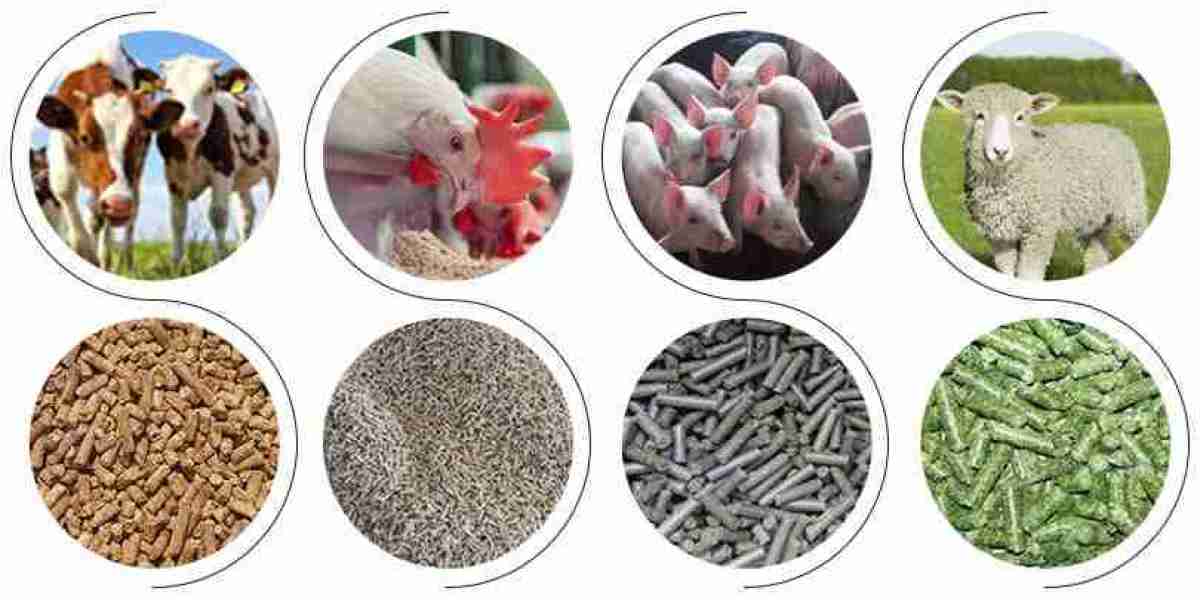The animal feed additives market is undergoing a rapid transformation as farmers, producers, and feed manufacturers increasingly seek functional and specialty additives to meet evolving consumer demands and regulatory standards. As the global demand for high-quality livestock products grows, so does the need for advanced feed solutions that improve the health, efficiency, and productivity of animals. The shift towards more functional, health-focused, and nutritionally optimized feed additives is expected to continue, propelling the market’s future growth and innovation.
Functional Additives: Meeting the Growing Demand for Animal Health and Performance
Functional additives in animal feed are designed to serve specific purposes beyond basic nutritional support. They enhance the overall health, welfare, and performance of livestock, making them an essential part of modern farming practices. Among the key functional additives gaining popularity are probiotics, prebiotics, enzymes, and amino acids.
Probiotics and Prebiotics: These additives are used to promote gut health by supporting the balance of beneficial microorganisms in the digestive system. Probiotics, such as Lactobacillus and Bifidobacterium, have gained traction due to their ability to enhance digestion and immune function, reduce the reliance on antibiotics, and improve overall animal performance. As more countries impose regulations on antibiotic use, probiotics have emerged as a critical alternative.
Enzymes: Enzymes like phytase, xylanase, and protease are increasingly used to break down complex compounds in animal feed, improving nutrient absorption and feed efficiency. This leads to healthier animals with better growth rates and reduced feed waste. Enzymes are particularly valuable in monogastric animals, such as poultry and swine, where digestibility is a key concern.
Amino Acids: These additives play a critical role in animal growth and metabolism. By adding amino acids such as lysine and methionine, farmers can improve feed formulations to ensure that animals receive the optimal protein levels necessary for healthy development and production.
Specialty Additives: Catering to Niche Markets and Health Concerns
Alongside functional additives, specialty additives are gaining momentum in the animal feed additives market. These additives address specific health concerns, enhance product quality, and support niche market demands.
Organic and Natural Additives: As consumer preferences shift toward more natural and organic food products, there has been a surge in demand for organic feed additives. These additives, such as plant-based extracts, essential oils, and herbal additives, are gaining popularity due to their perceived health benefits, such as boosting immunity, enhancing flavor, and improving digestion. These natural solutions align with the growing trend of clean-label products, where consumers demand transparency and healthier, antibiotic-free food sources.
Antioxidants: The growing focus on animal health and product quality is also driving the demand for antioxidants in animal feed. These additives protect against oxidative stress in animals, improving meat quality, shelf life, and overall health. Antioxidants such as vitamin E, selenium, and beta-carotene are used to promote animal health and improve the nutritional value of animal products.
Mycotoxin Binders: Mycotoxins are toxic compounds produced by molds that can contaminate animal feed, leading to health issues in livestock and reduced production efficiency. Mycotoxin binders are specialty additives used to neutralize or bind these toxins, reducing their harmful effects. As concerns over feed contamination grow, mycotoxin binders are becoming an essential part of animal feed formulations, especially in regions with high moisture levels where mold growth is more prevalent.
Technological Advancements and Precision Nutrition
The future of the animal feed additives market will also be shaped by technological innovations, particularly in precision nutrition. This involves tailoring feed additives to meet the specific nutritional needs of individual animals or animal groups, improving feed efficiency and reducing waste.
Precision nutrition leverages technology, such as data analytics and artificial intelligence, to create highly personalized feed formulations. By using data on an animal’s health, age, weight, and growth rate, farmers can adjust the inclusion of various additives to ensure optimal nutrition. This technology not only boosts productivity but also supports sustainability by minimizing overfeeding and reducing environmental impact.
Regulatory Push for Health and Sustainability
As regulatory agencies around the world implement stricter guidelines on animal health, environmental sustainability, and food safety, the demand for functional and specialty additives is expected to rise. Governments are focusing on reducing the use of antibiotics in livestock farming, promoting sustainable practices, and ensuring the quality of animal products.
This regulatory push is leading to the adoption of additives that promote animal welfare, gut health, and sustainability. Additives that reduce the environmental footprint of farming—such as those improving feed conversion rates and reducing emissions—are becoming more desirable as regulatory frameworks evolve.
Conclusion
The animal feed additives market is set to see continued growth and innovation as demand for functional and specialty additives rises. With increasing consumer awareness of animal health, environmental sustainability, and food safety, feed additives that improve the quality, efficiency, and health of livestock will remain in high demand.
As the market adapts to these evolving trends, companies that focus on developing functional, natural, and specialized additives will play a pivotal role in shaping the future of animal feed production. By embracing advancements in precision nutrition and responding to regulatory and consumer demands, the animal feed additives market is positioned for robust growth in the coming years.




